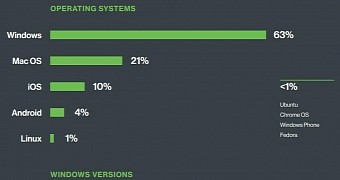Microsoft is working to make Windows more secure, but this doesn’t necessarily mean that users are always ready to adopt the company’s latest technologies, and a study released recently shows that security is not a priority for a big part of the userbase.
Duo Security looked into the existing Windows usage data to determine how many people are running vulnerable versions of the operating system or applications that could expose them to attacks.
And it turns out that there are many of them, as Windows 7, an operating system launched in 2009 and which is affected by no less than 600 security vulnerabilities, as the research shows, is still running on 65 percent of the PCs across the world.
Windows 7 is still running perfectly fine for many users, but Duo Security explains that upgrading to Windows 10 and implementing new security systems should actually be a priority for everyone because it’s the only way to remain secure, pointing out that older versions of the operating system are more and more exposed to attacks.
Windows XP lives on
Furthermore, the company is concerned that Windows XP is still around despite the fact that it’s 15 years old and it no longer receives support since April 2014.
Windows XP has 700 vulnerabilities and 200 of them are labeled as critical. 51 percent of Windows XP users are still running Internet Explorer, which no longer receives security patches either, while Chrome is second with 27 percent.
Duo Security also warns that out of all systems where Internet Explorer is used as the main browser, 20 percent of them are actually running unsupported versions of the app. Flash and Java are also running on the majority of systems and, what’s more worrying, they’re old versions that are vulnerable to attacks.
The firm doesn’t necessarily recommend switching to Windows 10, but says that additional security measures need to be put in place, including additional authentication solutions, regular security updates, and automatic updates for both the OS and apps.

 14 DAY TRIAL //
14 DAY TRIAL //